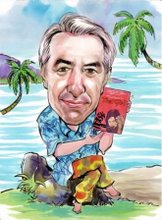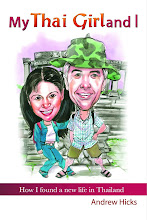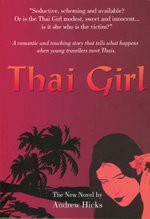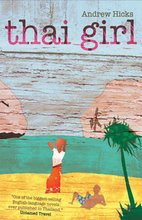

The Thai newspapers are often filled with images of utter horror, of accidents, murders and bombings... in Iraq, Pakistan, Afghanistan and Sri Lanka and sometimes much closer to home.
How can people go on with their lives after something like that? I cannot begin to imagine the horror of it all.
Everything is changeable but so far my life has been peaceful and my tragedies have been small. Even so, the story that follows happened many months ago and I have not been able to tell it until now. As I write I feel a tightness in my throat and am reluctant to relive it.
One day I was sitting at my laptop upstairs in our house out in the rice fields when I heard my wife, Cat walking round the side of the house. With no warning she called up to me.
‘Andrew! Leo die!’
My favourite dog is Pepsi and some time earlier she’d presented us with five adorable puppies. Cat wanted to keep one and Leo, a little bundle of trouble then became part of our lives. He was white with comic blobs of black, mischievous and bouncy and a total charmer. When tired, he’d retreat to his basket on the verandah and watch all the goings on, his cute little head poking over the side.
I marvel at the pure magic of a very ordinary dog. He was utter joy. Few things on this earth have such innocence, such appeal as a puppy. I marveled at his intelligence, his zest, his sense of fun.
In so many ways he was just like us, sharing the same experiences of hunger and fear, the same need for warmth, contact, companionship and affection. He was not a lesser being, only different, unaware of being on a mortal conveyer belt that can abruptly reach its end at any time.
‘Andrew! Leo die!’
I couldn’t believe what I was hearing. He couldn’t have died. He’s too young, too healthy, too much a part of us.
I rush out to the verandah and look down and there’s Cat cradling Leo in her arms. He's so still he must be sleeping.
I run downstairs and take him from her. He’s warm and soft, exactly as he always is… my puppy. But he’s limp and floppy, totally lifeless. He’s unmarked and beautiful and desperately I will him to wake up. But he never can be Leo again.
‘Big ice truck in the road,’ says Cat. ‘Go too fast.’
Why, why did he have to go so far from the house.
Only an hour ago I’d been out to shut the gate but they just don’t care. They always leave it open. If only he could have survived a few more months, he might have learned a little road sense and survived much longer.
We let Pepsi see him and she sniffs around him in alarm. It seems as if she understands. She seems sad.
Cat says we’ll bury him down the garden and goes to get the hoe. I help her dig the hole and then I take him in my arms and carry him to it. Nan and little Ping are with us and Ping is crying bitterly.
I have my dark glasses on so they can’t see my eyes but as I bend down to lower him into the hole, the tears fall into the lenses and I can hardly see a thing. Even months later I can’t get through writing this either.
Cat chants something in Thai over the little body. I know she’s distressed but she’s composed as Thais always are. And then finally we shovel in the soil and make a little mound over him. Cat has made a little cross… he must be a Christian dog, and she strews flowers over him.
For the next few days I cannot go anywhere near but Pepsi is always there, lying quietly beside the grave. I feared she’d dig him up, but no, she just seems to want to be close by. She really seems to be grieving.
Once while I was living in an African village, I heard the screams when early in the morning they woke to find their baby stone cold beside them. How intolerable that must have been. It’s always struck me that a little of my paracetamol could have saved the child, or simple oral rehydration perhaps. Death is sometimes avoidable and far too often we invite him in.
The lives of my parents were cruelly disrupted by two global wars but in comparison I have lived in peaceful times. The world has become a better place and is more stable than at any time for centuries, even while our powers of destruction increase. Paradoxically we think it’s getting worse because the media alerts us to all the horrors.
Today’s apparent conflict, a so-called ‘war’ is fought, not on the battle field, but is played out primarily in the media. Terror is a state of mind and not a state of war. It’s only becomes such if we call it a war and want to make it one.
After the twin towers atrocity the West was running scared. It was a big media event with great images and our leaders did everything they could to play on our fears, to promote the bogey men and to give them the oxygen of publicity. They told us that this small cell of deviants, a tiny cancer, was a malignant and fatal tumour that could end our very civilisation. How very foolish that was. How dangerous was their aggressive rhetoric, a desire for revenge that nourished and aggrandized the cancer.
And how foolish it was to unleash the dogs of war. Wars are rarely just and they provoke atrocities on all sides… in the heat of conflict men are not restrained by rules. Be it communism or terrorism, have we not had enough lessons in the last fifty years that you cannot drop bombs on an abstraction? You cannot assert your principles however valid they are, nor do you make friends by sowing death and destruction.
I find it hard now to grasp the sheer horror that has been unleashed in the name of freedom and democracy, but I do know that gratuitous violence solves nothing.
I’m angry too at the ineptitude of our leaders and the suffering they’ve caused, and I’m still upset about my puppy.






